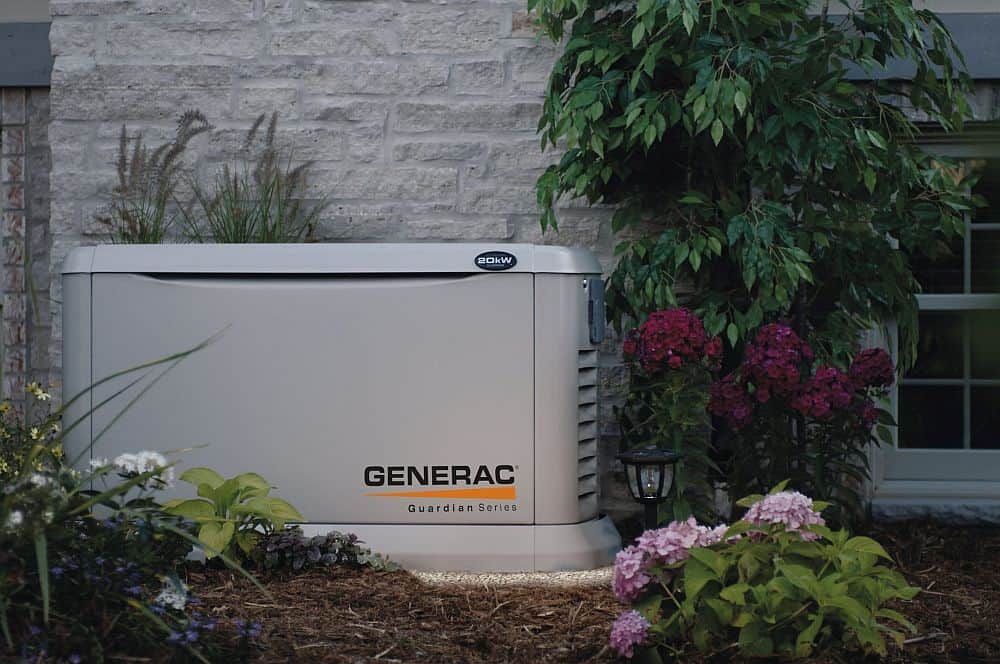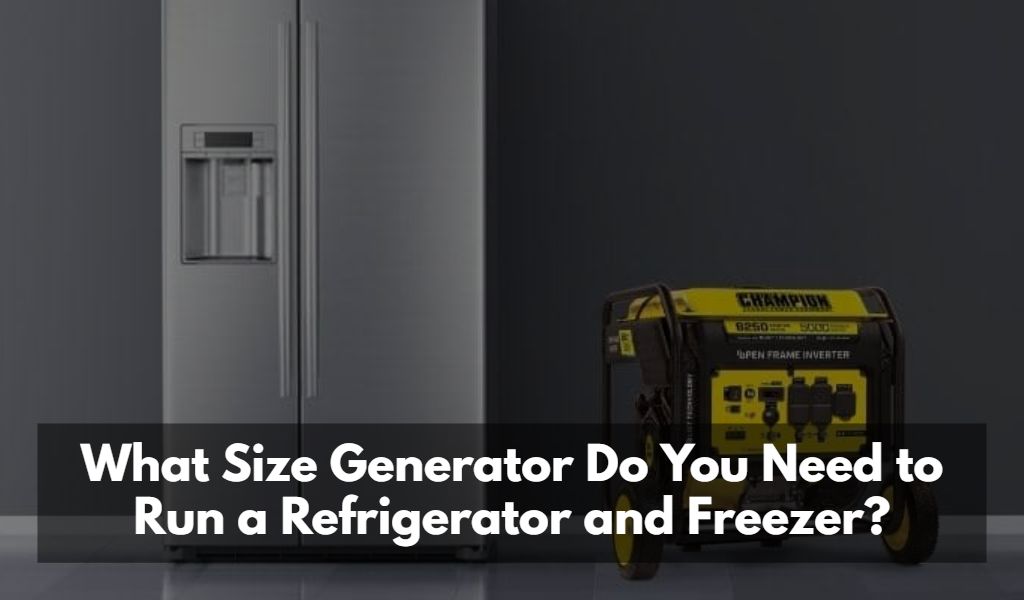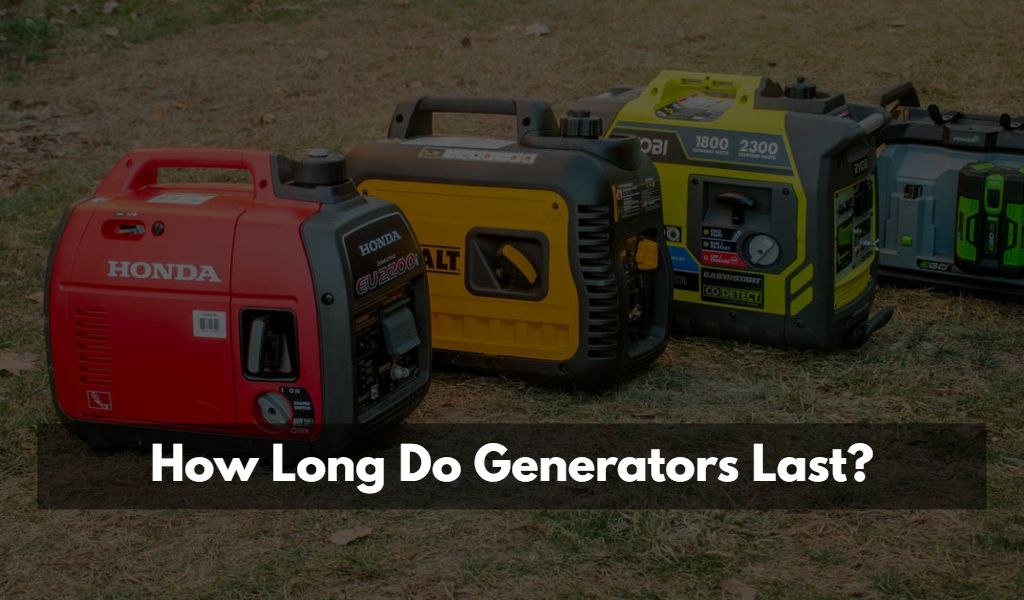Welcome to Generator HQ! Please note that some of the links in our articles are affiliate links. This means if you make a purchase through these links, we may earn a commission at no extra cost to you. These commissions support our work and allow us to continue bringing you valuable content.
If you search on the best whole house generator on the web, you’ll find plenty of websites with all the options you are looking.
Here’s the truth:
There are no tricks, hacks, or tips on how to choose the best standby generator.
It is a must for you to know the right information that can guide you to make a better decision.
So, if you are looking for ways you need to arrive at when choosing the best whole house generator, then we have something for you.
Ready, let’s start.
What is a Whole House Generator?
It is a backup system that switches instantly when there are power outages.
Within seconds of a blackout, the whole house generator senses the power loss using an automatic transfer switch and lets the generator start transferring the electrical load.
The whole house generator then starts supplying power to the house.
The thing is, every home will need a backup generator, we call it a home generator. In the event of a blackout, a home generator provides enough power.
That way, even frozen food remains refrigerated, and you’ll microwave meals while you enjoy.
The beauty of it is, you will install them once, and they will rescue you in the event of a blackout.
Best Standby Generators Comparison Table
| Image | Title | Score(/5) | Selling Point | Price |
|---|---|---|---|---|
 Top
Top | Generac 70432 Home Standby Generator Guardian Series 22kW/19.5kW Air Cooled with Wi-Fi and Transfer Switch, Aluminum | editable | editable | Check Lowest Price |
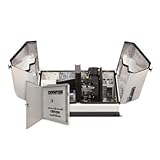 Top
Top
Top
Top
Top
Top | Champion 100294 | 4.5 | Operates in cold or hot weather, which still saves you on fuel consumption. | Check Lowest Price |
 Top
Top
Top
Top
Top
Top | Generac 7031 | 4.5 | Cost much the same as a portable generator. Portfolio for a budget conscious person | Check Lowest Price |
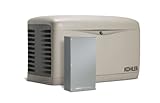 Top
Top
Top
Top
Top
Top | Kohler 20RESCL | 4.0 | Features power boosting technology and quick responses in case of power outages | Check Lowest Price |
 Top
Top
Top
Top
Top
Top | Generac 7037 | 4.5 | Lots of power for average users | Check Lowest Price |
Why You Need to Buy A Whole House Generator
- Low noise level for excellent operation. Most whole house generators have a new technology that muffles sound to reduce noise.
- They have longer maintenance levels. You’ll stay with them for a long time without much maintenance.
- The generator is excellent at fuel efficiency. Standby Generators will come with a high-quality engine that is reliable and efficient.
- Whole house generators are liquid-cooled to manage longer power outage durations. They feature A/C shedding and load management options.
- Home generators are a perfect solution if you want to back up your home. They can power sensitive and high wattage appliances.
Know Your House Size and Power Needs
Before you get carried away with shopping, you need to know how much power you need. Best of all, you need to know the size of your house. Below are some basic data points you will need to understand what size generator you need.
The first thing you need to do is do the math. Look at the utility bill of your average user rate.
You can ask an electrician or utility representative to help you know the estimate.
If you want to use only essentials, you can do away with things like electric stove, air condition, Chances are, you will consume about 7kw.
The number 7kw is a bare least wattage for a homeowner to use. Seven kilowatts is what you’ll need from a portable generator.
But the main reason why people get a whole house generator is to use most of their amenities.
The thing is, you’ll want to use tech devices, heat, or air conditioners despite the weather.
Plus you want to get through the period without sacrificing most of the things like Tv or Microwaves.
Since you want to use a whole house generator, they are a few benchmarks you need to adhere:
- Use your utility bill to estimate the cost or as a reference on the number of things you’ll use.
- The recommended watts for a small or average house is between 11kw-14kw. That’s enough power for most electrical appliances and utilities at homes to run. Those watts are ideal for a small house or average home wanting to use a large central air system.
- If you live in an average house with a sump pump, furnace, water pump, and anything that would need electrical load. You’ll want to shoot for something around 16kw. We feel this is a general rule of thumb for people with a small or average house but don’t live lavish life.
If you have a large house, you’ll need more than 20kw. More than 20kw will cover any large electrical load you may have in the house.
Decide on the Budget
The price for a home or whole house generator will range from $3000. The cost can go up to $10,000+. If you are an average homeowner, you should aim for between $3,500 to $7, 500.
If you are looking for massive horsepower, you can go for anything above $7500. The more powerful the generator, the more it will cost you.
Expensive generators are efficient. They have safety features that makes them valuable to use. Anything below $4, 000 is powerful and less efficient.
That explains why seeing a budget of 16kw as $4,000 is typical. While the same efficient generator delivering 14kw will cost the same more.
If you are budget conscious, you may want something sturdy and less efficient.
On the flip side, an efficient generator will save you fuel over prolonged usage. The budget you have should factor in the needs you have at home.
If you live in an area experiencing power outages. You may want to get reliable and efficient generators, which is a high end.
The same applies to adverse weather areas. Spend as much as you can on a wholesome generator.
Whole house generators are suitable investments that add value to your home.
How Safe Are They?
Those machines are flammable and combustible. That means you’ll need to take care of extra caution.
The best thing you can do is to get a professional to help you install it. Most wholesome generators will come with essential safety functions installed.
To stay safe, maintain generators with an electrician present since the machines have a gas line connection. Regular maintenance is something you need to do.
Is It Easy to Install A Whole House Generator?
A certified electrician or engineer needs to install a whole house generator. Those guys know how to make all the logistics of installation a breeze.
When you have a place that’s near to the gas line, you will dig a hole to create padding for the generator.
The padding can be anything like or close to wood or concrete.
Which Kind of Transfer Switch Will You Use?
They are two different kinds of transfer switch:
- Manual transfer switch
- Automatic transfer switch
The transfer switch is for emergencies. Even better, they make the generator run automatically in the event of power outages.
Some whole-house generators will have a manual transfer switch and others automatic.
One thing to keep in mind is lack of automation won’t come with cost savings:
Your electricians will determine the size of the transfer switch to use based on the amperage and the location.
This will also depend if you are using the generator to power the whole house or emergency loads.
If you have the system power the whole house, you may need a transfer switch rated ‘service entrance.’
That way, it will incorporate a utility disconnect within the transfer switch cabinet.
Do You Have the Permit and License?
Before you install a whole house generator, make sure you have the building permits. You have to also adhere to the legal necessities needed in your area.
The first thing to do is seek advice from the contractor so he can assist you with planning and all the necessary logistics.
Which Fuel Source Will You Use in The Whole House Generator?
For natural gas, you’ll need a plumber to do the installation. Make sure the generator gets connected to the line by an experienced electrician.
If you want to use a dual-fuel propane, or single-fuel propane generator, you have to make sure you have extra storage spaces and enough supply for it.
The good thing about natural gas is, it is available for most of the time. The only thing you have to remember is, it costs more to install.
Propane is an excellent source for people who want to be off-grid. It may be expensive to run most of the time, but if you have a decent stuck, you can use it in any situation.
FAQ About Whole House Generator
What is the life expectancy of the best whole house generator?
They are powerful machines. They can endure elements, power surges, and blackouts. If you are maintaining the generator well, you should be able to use it for more than 3,000 working hours.
If you do a regular or quarterly maintenance, expect to live with these generators for 30 good years.
Is there a difference between an air-cooled or liquid-cooled backup generator?
The difference lies in the engine. For the sake of clarity, it means, the engine is cooling down using a different system.
Most air-cooled generators use a high-speed fan to reduce overheating. Liquid-cooled generators use radiators like those found in a car.
If you follow the tutorial, Can I install the whole house generator?
You can install the whole house generator if you follow the tutorial. Since installing a generator is not a one-person job, we advise you not to do so. Because the units are too heavy, you’ll need to be two people to install.
Second, if you do it alone, you may damage parts when installing, and this may affect the warranty policy.
Even if you are the most experienced veteran, you need a professional to help you.
Reviews of The Best Whole House Generators
1. Generac 70432 Guardian Series (22KW)
- 5-Year limited Warranty for automatic standby generators.
- Up to whole house protection with the 200 Amp, NEMA 3R (aluminum outdoor enclosure) smart switch
- Smart, User-friendly controls. Generac’s evolution controller features a multilingual LCD display that allows you to Monitor Battery status and track maintenance intervals to ensure your generator is always in top operating condition.
Prices pulled from the Amazon Product Advertising API on:
Product prices and availability are accurate as of the date/time indicated and are subject to change. Any price and availability information displayed on [relevant Amazon Site(s), as applicable] at the time of purchase will apply to the purchase of this product.
The Generac 70432 is different from 16KW models because it’s more powerful. The system powers even the largest home with lots of electrical loads.
There are lots of Whole House Generators with this power capability like Kohler. The thing is none of them competes with the Generac.
Generac may not be appealing on paper, but it’s the best long-term investment.
The Generac has 22KW running output. Most important, it is the biggest air-cooled generator on the market recommended for residential uses.
Since it doesn’t cost twice like the 11KW model, its high output is so impressive.
You got a lot of value for your money. Besides that, the model has a lower cost-per-kilowatts than any other generator,
Since it is large, you don’t need to worry about installation because you can install it the way you install others.
Best of all, you don’t need to bother with a concrete platform, because of the users ground pad.
If you compare the Generac to Kohler or Briggs and Stratton models, the model is great for long term performance.
The Generac may not have all the fanciest features, but you do have the basics. Besides that, thanks to its online monitoring systems, you can connect it on mobile.
For safety purposes, there’s intelligent overload protection that alerts you. The system has low maintenance.
Pros
- Weatherproofing, corrosion-resistant housing
- Air cooling system
- User-friendly control panels
- CARB compliance
Cons
- You’ll need to attach it to a 250 or 500-gallon tank
- Not certified to use in Canada
- Loudest
2. Champion 100294 Home Standby Generator
The 100294 Champion version is a friendly generator with 14KW as its power output on propane, and natural gas, its production is 12kw.
The generator has a noise level of 63 dB, and this is the sound of a normal conversation or low muffler tones.
Like most generators, this one comes with a 200 amp automatic transfer switch for excellent functioning.
When you experience a blackout, the generator starts working so soon. That way, you won’t have to wake up in the middle of the night to switch it on.
The generator’s 24-volt starting system makes it operates in extreme heat weather. Since it is a high-quality generator, it won’t need a warming kit.
What about its total harmonic distortion?
The harmonic distortion is less than 5%. That means you won’t have to worry about your delicate electronics receiving damaging.
Since you can keep it close to 18 inches from your houses, it has the least footprint.
The other benefit the generator has is it can withstand a salty environment and storm. That is to say; It’s anti-corrosive.
Besides that, it is only a generator offering you a 10-year warranty with free technical support. The whole of the generator command line is automated.
That said, it can perform weekly diagnostics on itself and alerts you if there’s any problem.
Pros
- It Produces lots of power and less than 5% total harmonic distortion.
- The 24-volt starting system operates in both cold and hot weather.
- Comes with a sturdy and durable enclosure
- The 10-year warranty and free excellent support.
Cons
- Heavy
- You need technical support to install the generator.
3. Generac 7031 Guard Series (11kw)
 If you are budget conscious, this is a generator worth checking out. The powerful machine is compact and convenient.
If you are budget conscious, this is a generator worth checking out. The powerful machine is compact and convenient.
It’s the best generator you can use if you live in an average home or a small house.
The good news is, it will keep your entire house running if you have a basic need.
The Generac 7031 comes with plenty of smart features making it a reliable, low maintenance backup system.
Expect this generator to crank out lots of power for its footprints. At only 11KW, expect Generac to keep a small to midsize home running in the event of power outages.
The only thing to do is reduce the extra usage on things like Tv in case of power outages last long.
Our general baseline recommends for powering the basic is 7kw. What sets this generator apart from others is consisting of the power output.
Although the generator is cheap, the evenness of its output is excellent like the champion.
Its power comes at less than 5% harmonic disturbances, which is clean and safe.
You can run the generator on propane or natural gas. It has a small footprint which takes 2X4 foot. The generator has a user-friendly controller.
You’ll see two lines of text, color-coded and backlit buttons for operations. You can also connect the generator with the comfort of your mobile phones.
Well, this is an extra feature you’ll have to pay separately.
The generator has its computer running its tests and self-evaluation. Besides, making sure you have enough fuel, there’s little maintenance you can do.
What you’ll love on this generator is the tests run at the slower RPM. Well, this means, the machine performs some tests while consuming less fuel.
Besides that, it has an aluminum enclosure making it a weatherproofed generator.
In other words, the generator can run in cold and wet conditions without any issues.
Something you’ll run into with lots of cheap generators is the housing. In this case, it’s corrosion-resistant. But that’s not all. The housing also prevents tampering.
Pros
- CARB-compliant
- Quiet at 63 decibels.
- Uses either 16-circuit or 200-amp transfer switch
- 5-year warranty
Cons
- You will have to budget for a battery.
4. Kohler 20RESCL 20000 Watt
 Kohler is known for its quality products. When it comes to this generator, a lot of needs to be said.
Kohler is known for its quality products. When it comes to this generator, a lot of needs to be said.
The 20RESCL has lots of features, making it an excellent choice for anyone looking to buy a whole house generator.
Besides its array of features, you’ll love its durability and corrosion-proofing enclosure.
Thanks to its enclosure system, the generator can withstand the harshest weather conditions.
A great feature of this model is the low noise level. It has a dampening noise enclosure making it one of the quietest whole house generators on the market.
Besides that, the generator is compliant with safety standards such as NEMA, ANSI, and IEEE. It comes with an easy-to-read display showing text messages about the generator status.
It is an air-cooling system meaning. You won’t need a water-cooling system to install.
The generator provides a 20,000 watt medium-sized home. Besides that, the generator has a 200-amp automatic transfer switch alerting it in case of power outages.
Pros
- Corrosion-resistant enclosure
- Excellent digital voltage and frequency
- PowerBoost technology to start larger loads
- Fast responses
Cons
- Lack of quality control
- High set up costs.
5. Generac 7037 Guardian Series (16KW)
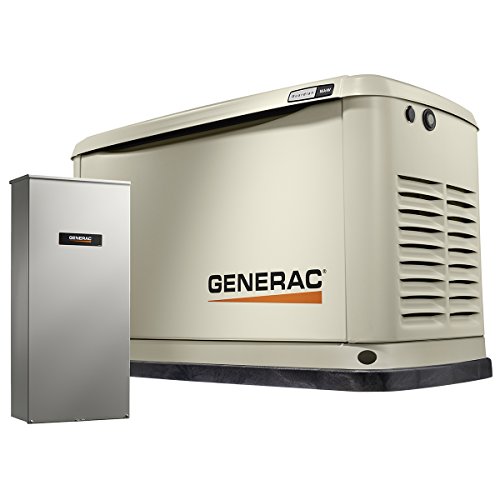 The Generac has similar features like the rest but more power to work. If you don’t like the Kohler model, this Generac model is reliable in operation and performance.
The Generac has similar features like the rest but more power to work. If you don’t like the Kohler model, this Generac model is reliable in operation and performance.
The generator can run all the essential operations in both small to large homes. While I will advise you to know the total wattage you need, I find the generator excellent for the average buyer.l
With 16kw as its running watts, the 7037 throw out enough power to make sure your home is running well interrupted.
The good news is it has a large motor that won’t work twice as hard as its 11kw needed.
One of the main reasons why you will prefer it is because it is safe to install given that most generators. Second, you can install this one without a concrete base.
Provided there’s a level spot with excellent drainage, and you can use the same ground pad. Generac isn’t a perfect match, but you can rely on it in case of outages.
Pros
- Lots of power
- Easy to install
- Large motor
Cons
- Installing will cost extra, and you’ll have to buy an appropriate battery
Our Top Choice for the Best Whole House Generators
In the spirit of staying neutral and without brand affiliations, we know the Generac 7042 is the best standby generator for medium and large houses.
While we would like to recommend Champions Power Equipment Standby Generator 100294 like other reviewers, we’ve found out that it is not as reliable as what Generic 7042 offers.
The champion still impresses us today as the second runner up. Rest assured we’re not recommending Generic 7042 for the sake of doing that.
We’d want to see the stiff competition on the whole house generator innovation and efficiency.

